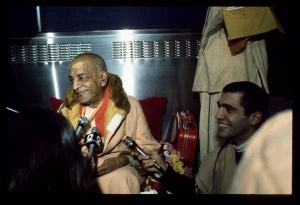SB 7.5.15

A.C. Bhaktivedanta Swami Prabhupada
TEXT 15
- śrī-nārada uvāca
- etāvad brāhmaṇāyoktvā
- virarāma mahā-matiḥ
- taṁ sannibhartsya kupitaḥ
- sudīno rāja-sevakaḥ
SYNONYMS
śrī-nāradaḥ uvāca — Nārada Muni said; etāvat — this much; brāhmaṇāya — unto the brāhmaṇas, the sons of Śukrācārya; uktvā — speaking; virarāma — became silent; mahā-matiḥ — Prahlāda Mahārāja, who possessed great intelligence; tam — him (Prahlāda Mahārāja); sannibhartsya — chastising very harshly; kupitaḥ — being angry; su-dīnaḥ — poor in thought, or very much aggrieved; rāja-sevakaḥ — the servants of King Hiraṇyakaśipu.
TRANSLATION
The great saint Nārada Muni continued: The great soul Prahlāda Mahārāja became silent after saying this to his teachers, Ṣaṇḍa and Amarka, the seminal sons of Śukrācārya. These so-called brāhmaṇas then became angry at him. Because they were servants of Hiraṇyakaśipu, they were very sorry, and to chastise Prahlāda Mahārāja they spoke as follows.
PURPORT
The word śukra means "semen." The sons of Śukrācārya were brāhmaṇas by birthright, but an actual brāhmaṇa is one who possesses the brahminical qualities. The brāhmaṇas Ṣaṇḍa and Amarka, being seminal sons of Śukrācārya, did not actually possess real brahminical qualifications, for they engaged as servants of Hiraṇyakaśipu. An actual brāhmaṇa is very much satisfied to see anyone, not to speak of his disciple, become a devotee of Lord Kṛṣṇa. Such brāhmaṇas are meant to satisfy the supreme master. A brāhmaṇa is strictly prohibited from becoming a servant of anyone else, for that is the business of dogs and śūdras. A dog must satisfy his master, but a brāhmaṇa does not have to satisfy anyone; he is simply meant to satisfy Kṛṣṇa (ānukūlyena kṛṣṇānuśīlanam (CC Madhya 19.167)). That is the real qualification of a brāhmaṇa. Because Ṣaṇḍa and Amarka were seminal brāhmaṇas and had become servants of such a master as Hiraṇyakaśipu, they unnecessarily wanted to chastise Prahlāda Mahārāja.